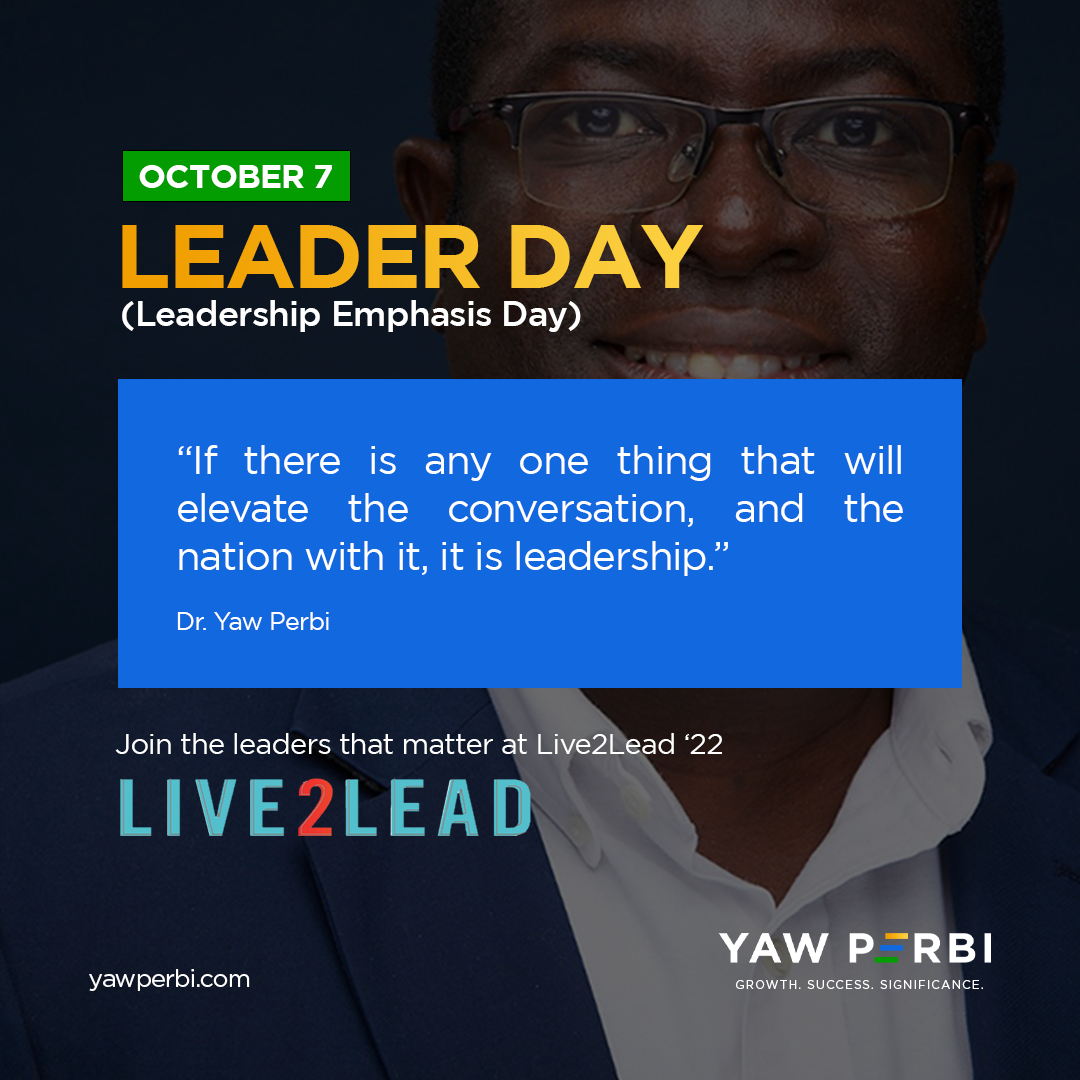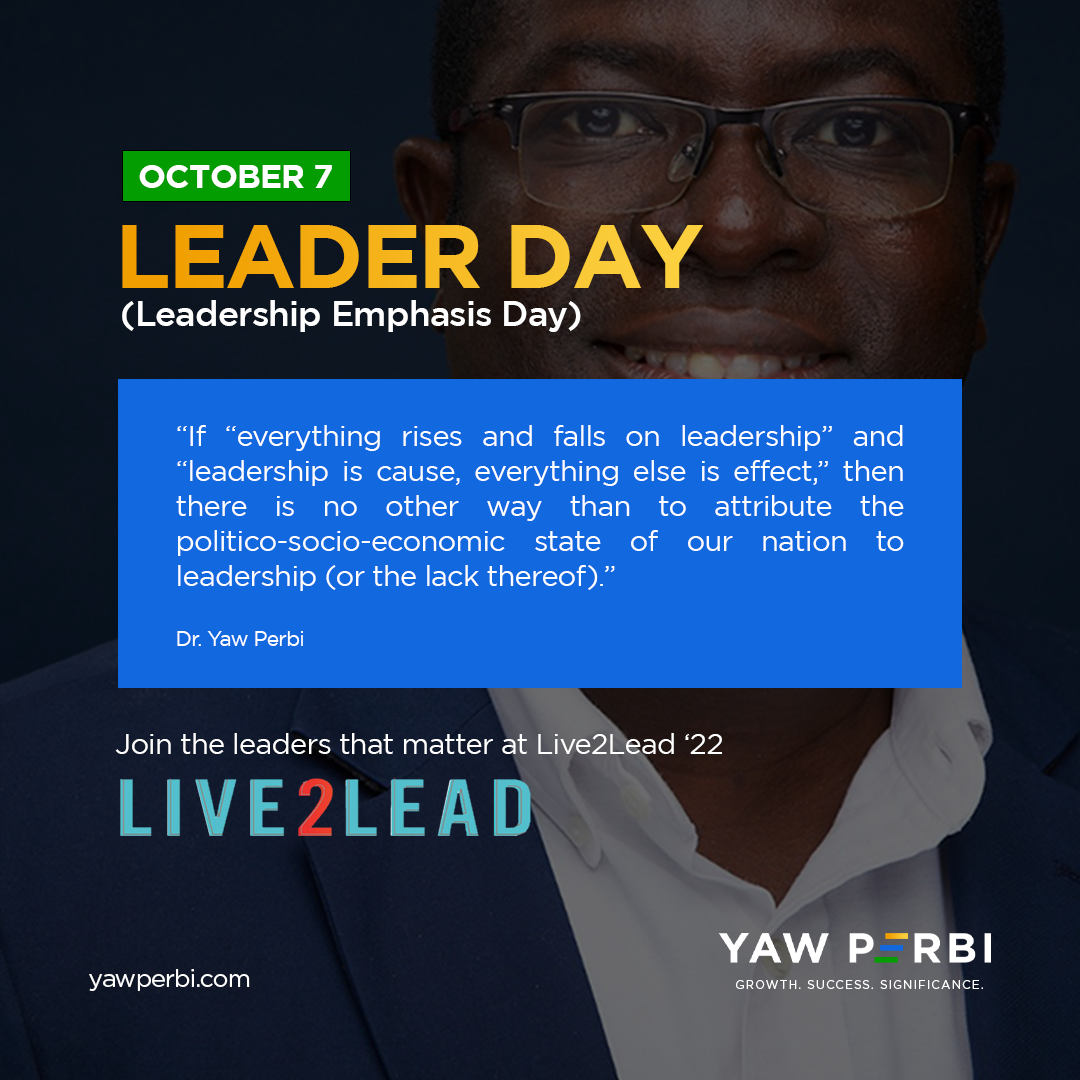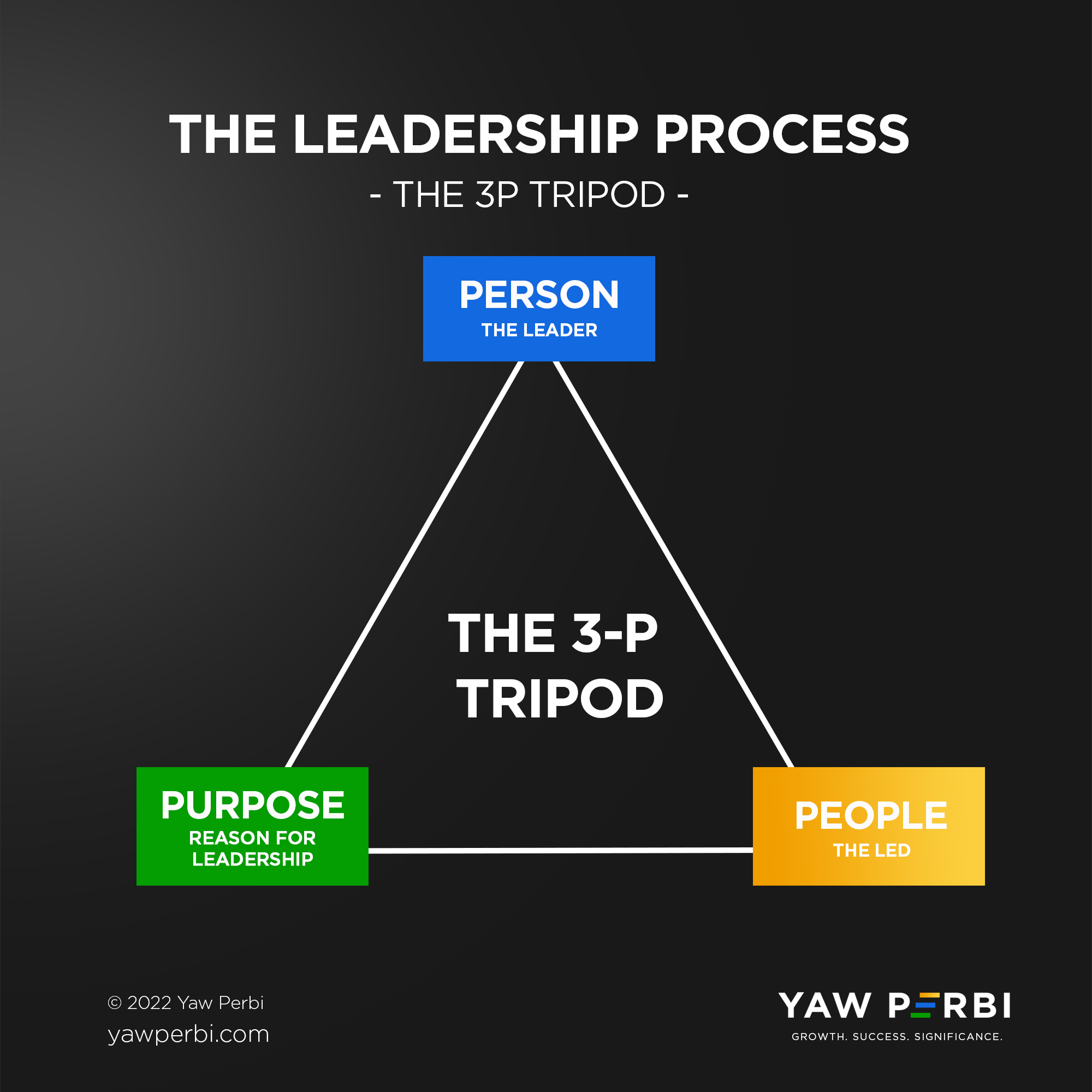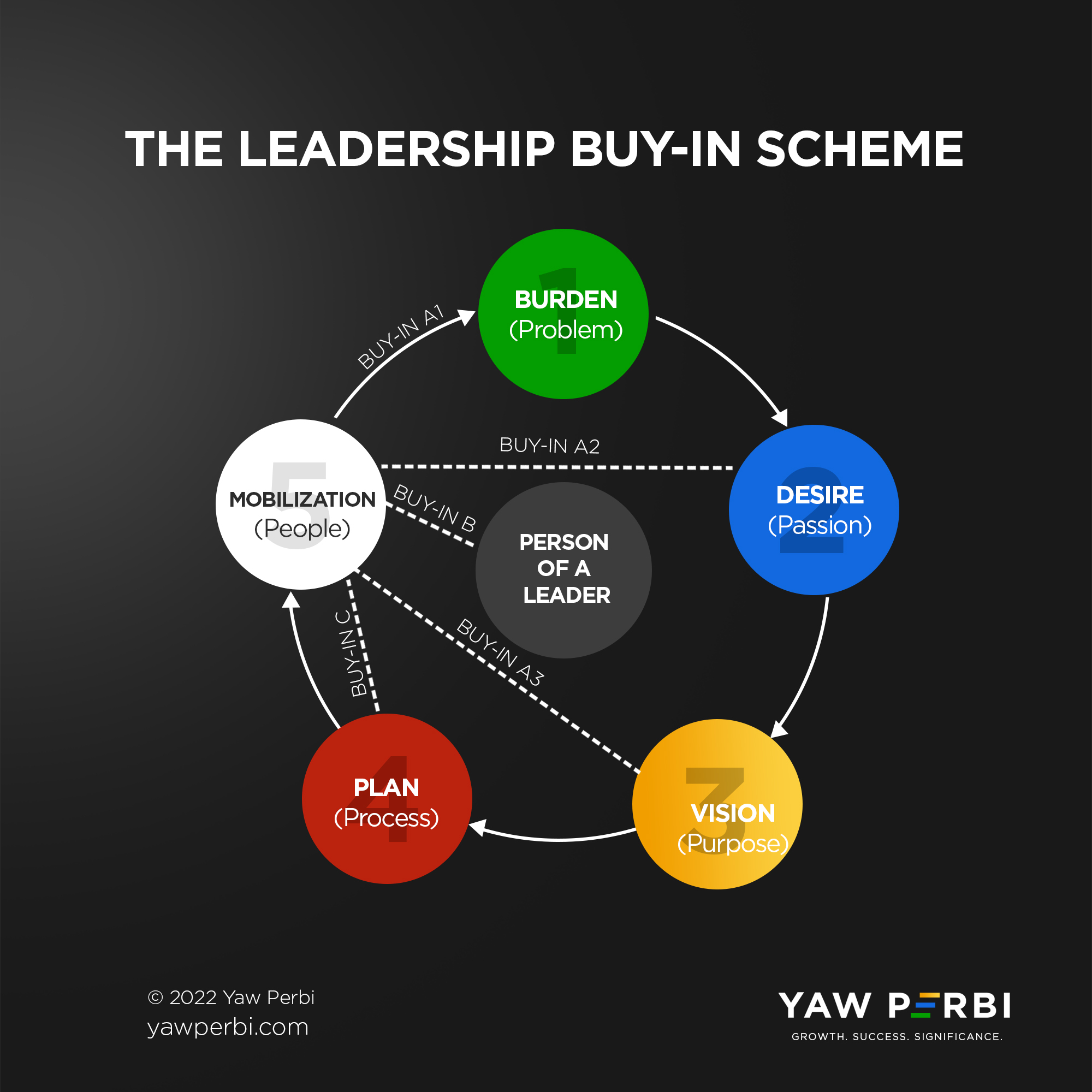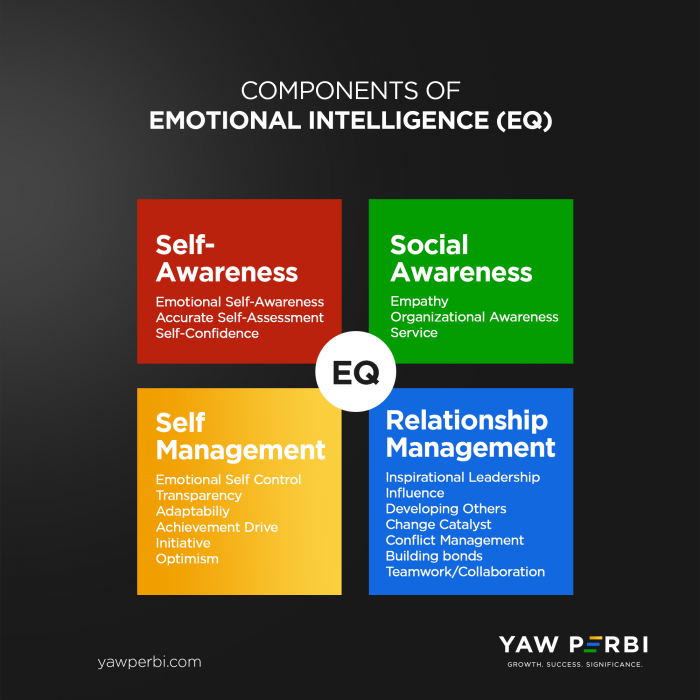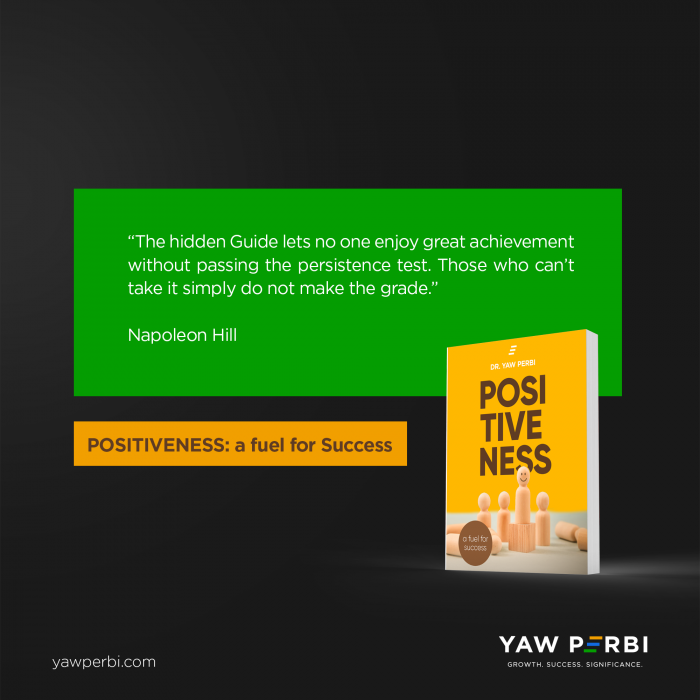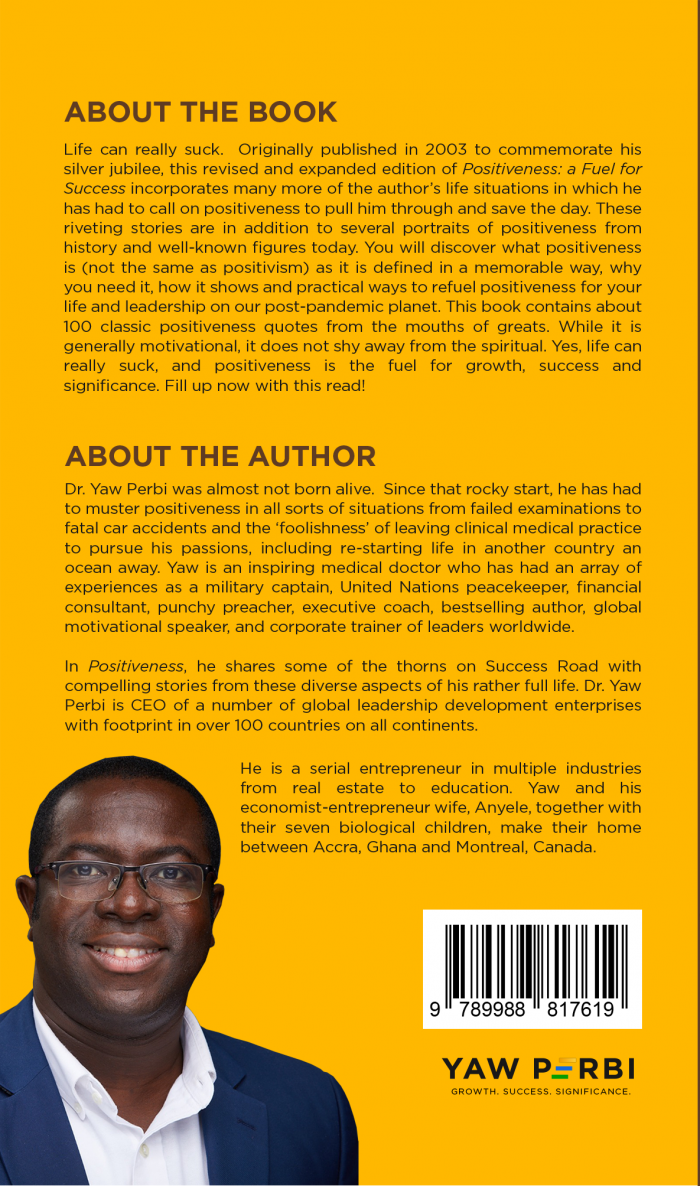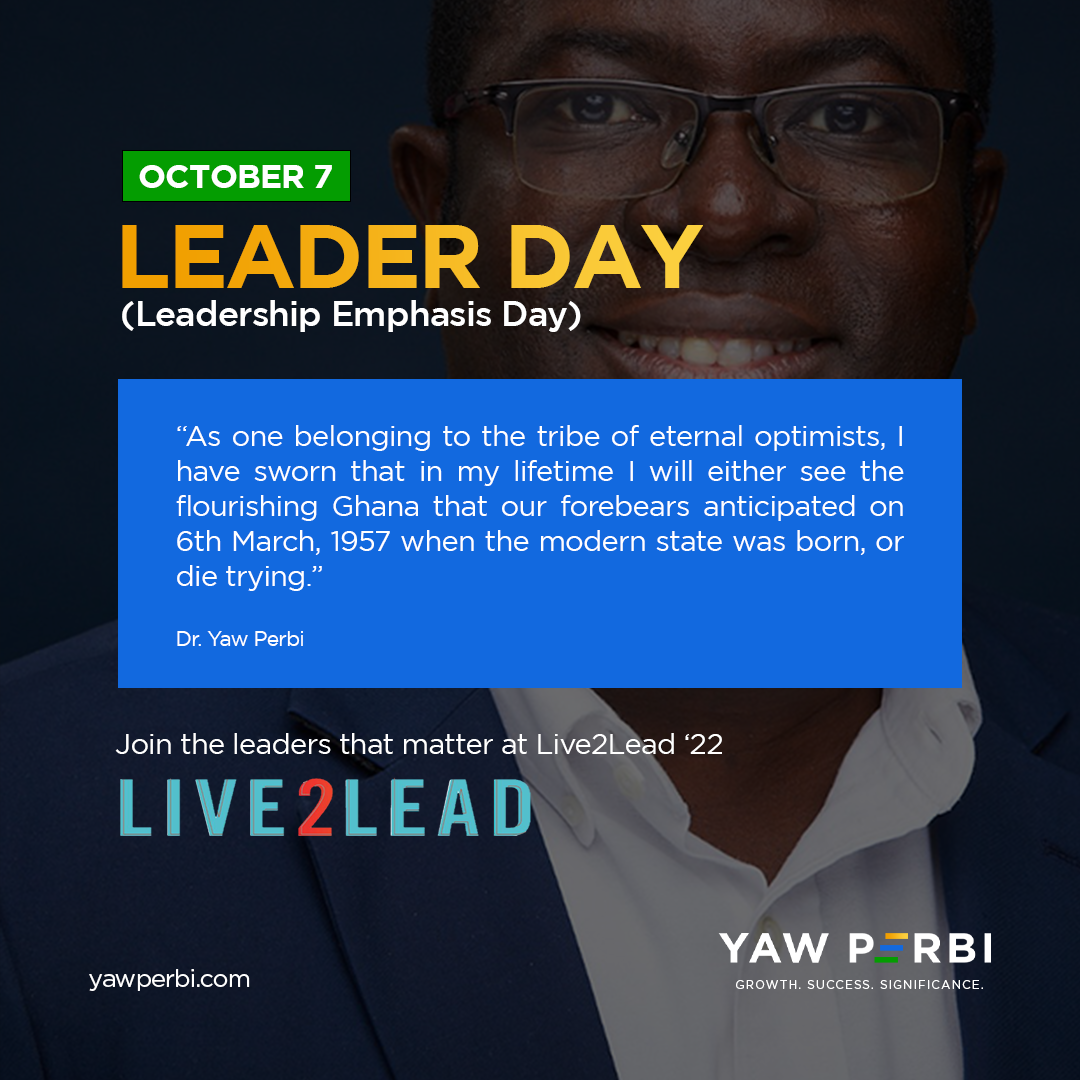
Leader Day, October Day
The world is not in a good place. Leadership is the cause. And when it comes to Ghana’s situation in particular, I have personally been shocked at the number of C-level leaders I have interacted with that have either completely lost hope in the future of the country or nearly have. “How did we get here???” one CEO of a major bank asked me via text (yes, with three question marks).
If “everything rises and falls on leadership” and “leadership is cause, everything else is effect,” then there is no other way than to attribute the politico-socio-economic state of our nation to leadership (or the lack thereof). In the same way, if there is any one thing that will elevate the conversation, and the nation with it, it is leadership.
DO OR DIE TRYING
As one belonging to the tribe of eternal optimists, I have sworn that in my lifetime I will either see the flourishing Ghana that our forebears anticipated on 6th March, 1957 when the modern state was born, or die trying. When the nascent nation was named ‘Ghana,’ our great grandparents were hopeful it would reflect the prosperity of the old Ghana empire, hence our new name (from Gold Coast). Oh, it bears repeating: our tribe of eternal optimists will see to a prosperous Ghana in our lifetime or die trying.
“I HAVE A DREAM, I HAVE A DREAM…”
Every true leader has a dream they passionately pursue with their people. I realize there is a day dedicated to almost every cause under the sun and pretty much each of the Sustainable Development Goals (SDGs)—women’s day, water day, literacy day, friendship day, founders day … even toilet day. Yet the one thing that causes each of these matters to rise or fall has no such day dedicated to it to elevate and emphasize it. Even then, is a day enough? Surely not; but it is a good catalyst for the remaining three hundred and sixty four (or five) days.
My fellow Maxwell-trained and certified collaborators in Ghana and I have a dream that ultimately the first Friday of October each year will become universally known as LEADER DAY. There is nothing special about the first Friday in October per se except that consistently for about a decade now, our mentor and leadership expert, John C. Maxwell, has been gathering some of the best leadership minds and hearts on the planet to speak to the issue, and we might as well leverage the opportunity rather than reinvent the wheel. Live2Lead is the name of that event. The name says it all, that’s our purpose on earth: We live to lead.
Gwen Addo, the pulchritudinous CEO of the Hair Centre and speaker at Live2Lead Ghana ‘22 affirms this vision: “I also pray your dream comes true and October 7 becomes a “leadership day” or perhaps October becomes a “leadership month.”” She continues, “leadership is close to my heart … and why not dream it bigger than just a day.”
You and I know the dearth of leadership in our country. We, Maxwell certified trainers who are Ghanaian, are aiming to get 2,000 leaders at all levels to benefit from the LIVE simulcast from Atlanta. We will organize local content for our context first, sandwiching the global feed. You would want to be with Patrick Awuah (Founder & CEO, Ashesi University), Patricia Obo-Nai (CEO, Vodafone), Uncle Ebo Whyte (CEO, Roverman Productions), Gwen Gyimah Addo (CEO, The Hair Senta), Kathleen Addo (Chairperson, National Council for Civic Education) and Kwamina Asomaning (CEO, Stanbic Bank). The core issue on the table this time, or shall I say by the fireside, is “Leading with Integrity & Inspiring Hope, for the Common Good.”
STRATEGY
On October 7, we shall convene 2,000 Ghanaian leaders online. At least half of them will be from 100 companies, institutions and organizations which would send 10 of their leaders to Live2Lead as their investment in themselves as well as boldly staking their claim in the prosperity of Ghana by raising the leadership lid in the country, one company at a time. All these companies will be listed as patrons in the event handbook, website and social media (in alphabetical order).
The other half will be made up of executive leaders from the private sector, the establishment leaders (public service) and emerging leaders from our schools and universities, representing the next generation. Companies, institutions and organizations which want to go beyond patron status will be given opportunity to sponsor the establishment and emerging leaders in exchange for significant air time and eyeballs.
This 2,000 is only for starters; we shall double in 2023; and double again and again till at least 2% of all leaders in Ghana are connected to this Live2Lead tribe of learners who lead and leaders who learn. That is the exact critical mass needed to see a self-propagating movement of leaders worth following in Ghana: 2% of the leader population.
CONCLUSION
The feedback from the ground as I have gone around is damning. Ruinous to the extent that although the theme we initially chose for our local content is ‘Leading with Integrity for the Common Good,’ we’ve had to come up with a conjoint theme of HOPE. Our people need hope. Leaders are brokers of hope, thus when they themselves are broken to the extent that they have no hope, what shall the rest of the people do?
Arise Ghanaian leaders!, established and emerging ones alike. We are better than this. Yet perhaps we are expecting leadership behaviours, values and attitudes that we haven’t first trained into people. Since we Live 2 Lead (that’s our purpose) let’s then Live 2 Learn (that’s the process) so we can all lead better and all make our nation great and strong. When the leader gets better, everyone and everything else does too. So let’s all show up!
One day in October, for starters. Just one day but who knows? Perhaps ‘October Day’ will in my grandchildren’s day be as well-known as ‘May Day’ is today. And for even better reasons, leadership-wise.
PS.
An event is not enough for sustained transformation thus there are leadership development and training pathways that will later be shared as a follow-up process between October 7 and the next Leader Day a year hence.
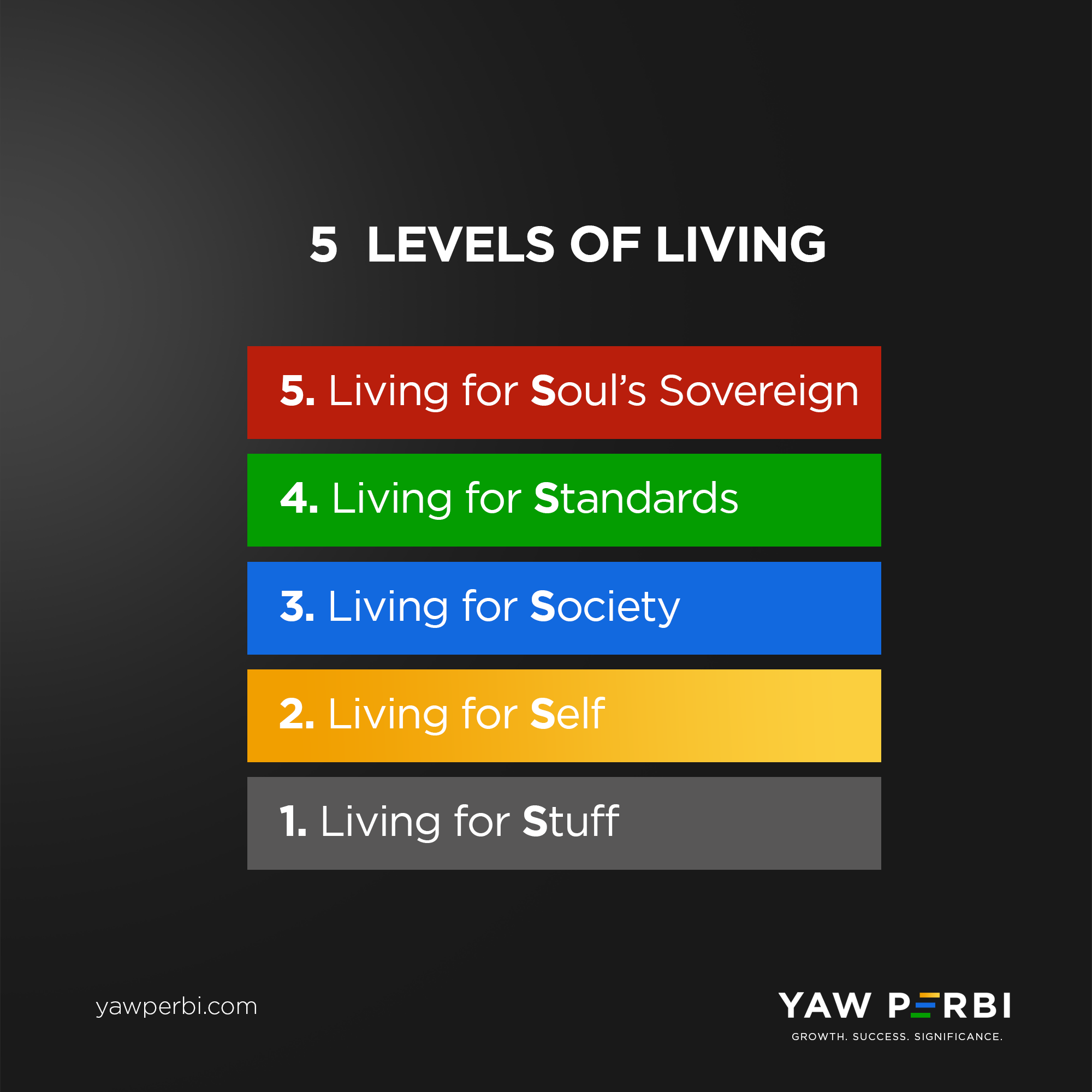
5 Levels Of Living
An Old But True Story on the Wall
One day, a king who had it all was confronted in the midst of a serious party he had thrown for his posse. His face turned white as wool when he beheld a disruptive sight: a dismembered hand had suddenly appeared and was writing on the wall pronouncing judgment on him (where the proverbial ‘the writing is on the wall’ comes from). He was wealthy, powerful and had connections but here he stood condemned under a gibberish clause. A later translation of the writing on the wall by a wise man revealed the following prophetic words: “You have been weighed and found wanting—you don’t weigh much.” Wow. Even a sovereign has a Sovereign who weighs everyone’s soul.
If the emperor’s wealth did not give him enough weight and his power was inadequate to exonerate him, there must be some things in life weightier and more powerful than others. And who determines the weights—ourselves, society, a sovereign? If there are levels of living I want to know.
A New and True CEO on the Block
A couple of weeks ago, I became friends with a CEO in Ghana l had never met before. In fact, the only reason l went looking for her was because the John Maxwell certified leaders in the country were seeking other significant leaders to speak at an annual John Maxwell simulcast in October, Live2Lead, and her name had come up from my Chief of Staff. We hit it off! Of course she is a beautiful person, smart, wealthy (she’s got stuff) but what excited me about her the most, which I later realized upon reflection made us connect so deeply and authentically, is that she is a Level 5 leader, living on the 5th floor.
l recognize that ‘5 Levels’ or ‘Level 5’ is used in different business contexts for different things. I have trained for John Maxwell for many years and he has a course I teach known as ‘5 Levels of Leadership.’ The ultimate leader operates at Level 5, where one’s influence is purely from respect of who you are and what you represent. Jim Collins, professor and author of ‘Good to Great’, also talks about the Level 5 leader as the executive who’s built enduring greatness through a paradoxical combination of personal humility and professional will. I am also using 5 Levels and Level 5 for different purpose. l have found that there are 5 levels of living:
- Living for Stuff
- Living for Self
- Living for Society
- Living for Standards
- Living for Soul’s Sovereign
1. LEVEL ONE—LIVING FOR STUFF
There are people who unapologetically live for stuff. They are the ones who say things like, “he who dies with the most toys (stuff) wins.”
By ‘stuff’ I mean tangible, living and non-living things, from those that meet our physiological needs (as outlined by Maslow like air, water, food, shelter, sleep, clothing and sex) to others beyond survival needs including big toys like luxury vehicles, bling, real estate. Be careful about the deceitfulness of stuff, especially of wealth.
People who live at this level would use and abuse themselves, others, ideals and due process and even God to get stuff. “Is life not worth more than what you will eat and drink?…” the greatest teacher there ever lived once rhetorically inquired. “Life is not defined by what you have, even when you have a lot.”
2. LEVEL TWO—LIVING FOR SELF
Elsewhere this greatest of gurus tells a story that illustrates both Level 1 and Level 2 living well:
There was once a rich man who had a bumper harvest. He was so thrilled, drew up warehouse expansion plans and said to his soul, “Self, you’ve done well! You’ve got it made and can now retire. Eat. Drink. Be Merry. Take it easy and have the time of your life!’“ Just then his soul’s Sovereign, God, showed up and said, “Fool! Tonight you die. And your barnful of goods—who gets it?”
So by Level 2, one has realized we eat to live and not live to eat. Although better than living for stuff, the Level 2 chap is living for a person, themself: me, myself, mine and I. While living for self may range from personal safety and health needs to employment (to put food on the table and change in the pocket), it really is a level of living where everything is about how anything and everything only promotes one’s personal well-being (physical, mental, emotional, social, spiritual) and ambitions. One gets even into social stuff only to the extent that it benefits oneself. This is self-help to the max. A scarcity mindset is abundant at this level of living.
Many leaders are unable to distinguish between self-care and selfish behaviour. Self-care is vitally important to be able to flourish and sustainably climb further up the ladder of life to higher heights, yet it is a life of not only personal success but also societal significance. If all the self-care is an end in itself then it has ended up as selfish. The object and subject in life at Level 2 is me, myself, mine and I. The Level 2 life is selfish living.
3. LEVEL THREE—LIVING FOR SOCIETY
This is living for the sake of others, people—the common good. It is living beyond me, myself, mine and I to considering the other—thou, they, them, thine. The greatest teacher who ever lived once said, “Greater love has no one than this: to lay down their life for their friend.” Even though this is an upgrade from living for one person (yourself) to several others, this is not always a healthy thing (we’ll save that for another day)..
Level 3 living begins a life of love beyond self to love as in belonging—friendship, intimacy, family, sense of connection—all the way to the esteem society bestows in the form of respect, status and recognition.
It is not an easy thing not to be selfish (Level 2), for even in apparently living at Level 3 people can use people—the very apparent act of living for society—still for their selfish ends in Level 2.
4. LEVEL FOUR—LIVING FOR STANDARDS
When Nelson Mandela faced trial for treason in April 1964, the words of his three-hour speech from the defendant’s dock epitomize the penultimate level of living: “I have cherished the ideal of a democratic and free society in which all persons live together in harmony and with equal opportunities. It is an ideal which I hope to live for and to achieve. But if needs be, it is an ideal for which I am prepared to die.”
Rather than life being about a living standard as an economic matter (a combination of wealth and services in Level 1), this Level 4 life is about living for standards, as in ideals, values and principles.
These standards and ideals are intangible values (unlike Level 1 where one values physical things) and even timeless, universal laws. These may include strength, freedom, and self-actualization (desire to become the most that one can be).
This is sagacious living, a life of enlightenment, like being a values-based leader and gunning for “the good society.”
It is portrayed as the discerning life of discerning people, living in rarefied air. This is the life many elites are envisaged to be living until scandals break out and we see through the charade that they were far lower on the rungs in reality.
5. LEVEL FIVE—LIVING FOR THE SOUL’S SOVEREIGN
I love Africa and have been so sick and tired of people thinking unless they traveled to the West they cannot make it. Despite the many opportunities to live, work or even study abroad, my Canadian-born wife and I turned a blind eye, resolutely living at Level 4 until one day our souls’ Sovereign called us up and sent us out with the following instructions: “Leave your country, your people and your father’s household and go to a land I will show you.” And so we did. First to Cote d’Ivoire for a year and then to Canada for the next dozen. And like William Borden, we too have had “No Reserves. No Retreats. No Regrets.”
Obedience to God is the highest level of living. Sometimes in living for the soul’s Sovereign one may still acquire stuff (Level 1), satisfy oneself (Level 2) or even please others (Level 3) and live out some cool values (Level 3) but make no mistake. Often, the only way to satisfy the soul’s Sovereign is to deny oneself, sacrifice the things of this world and eschew the applause of people.
Indeed, “What do you do when two high ideals clash?” is a Level 4 dilemma and that evaporates at Level 5 because what the soul’s Sovereign desires, dictates or even demands is what goes. No, religion per se is Level 4–a set of beliefs and values one lives by; even one’s notion of ‘God.’ Many Gen Zers say, “I am spiritual but not religious.” Even spirituality in itself would be Level 4 living. Level 5 living is having through one’s Level 4 spiritual quest discovered there is a sovereign One, the God of Heaven and all the earth, who has a good, pleasing and perfect purpose to be heeded.
Sure, there are many religions all claiming to have a corner on the Truth but I believe that anyone authentically seeking their soul’s Sovereign will eventually find Him (or be found by Him), when they seek with all their heart.
Conclusion
While one might find some correlation between my perceived 5 Levels of Living and Maslow’s Hierarchy of Needs, this is more. My classification goes way beyond the popular psychologist’s work. In fact, his peaks at my penultimate point. As mentioned in my introduction, if there are levels of living I want to know. Not only do I want to know so I can measure how I’m doing, I would like to know that I’m living my best possible life. Just like all dollars are dollars but there are denominations—a $5 bill isn’t the same value as a $100 one, every weight is a weight but there are milligrams and kilograms (even tons)—so are there levels in life. Will you live your best life? Check your weight, assess your level, in the eyes of your soul’s Sovereign. He still writes on walls.
Post Script
In the next blog, I’ll share what life on Level 5 looks like (in my coaching of several C-level executives I’ve found myself having to be a pastor in the marketplace. Even the best leaders need help to nurture their souls; denying it doesn’t take the reality away or render the need untrue).
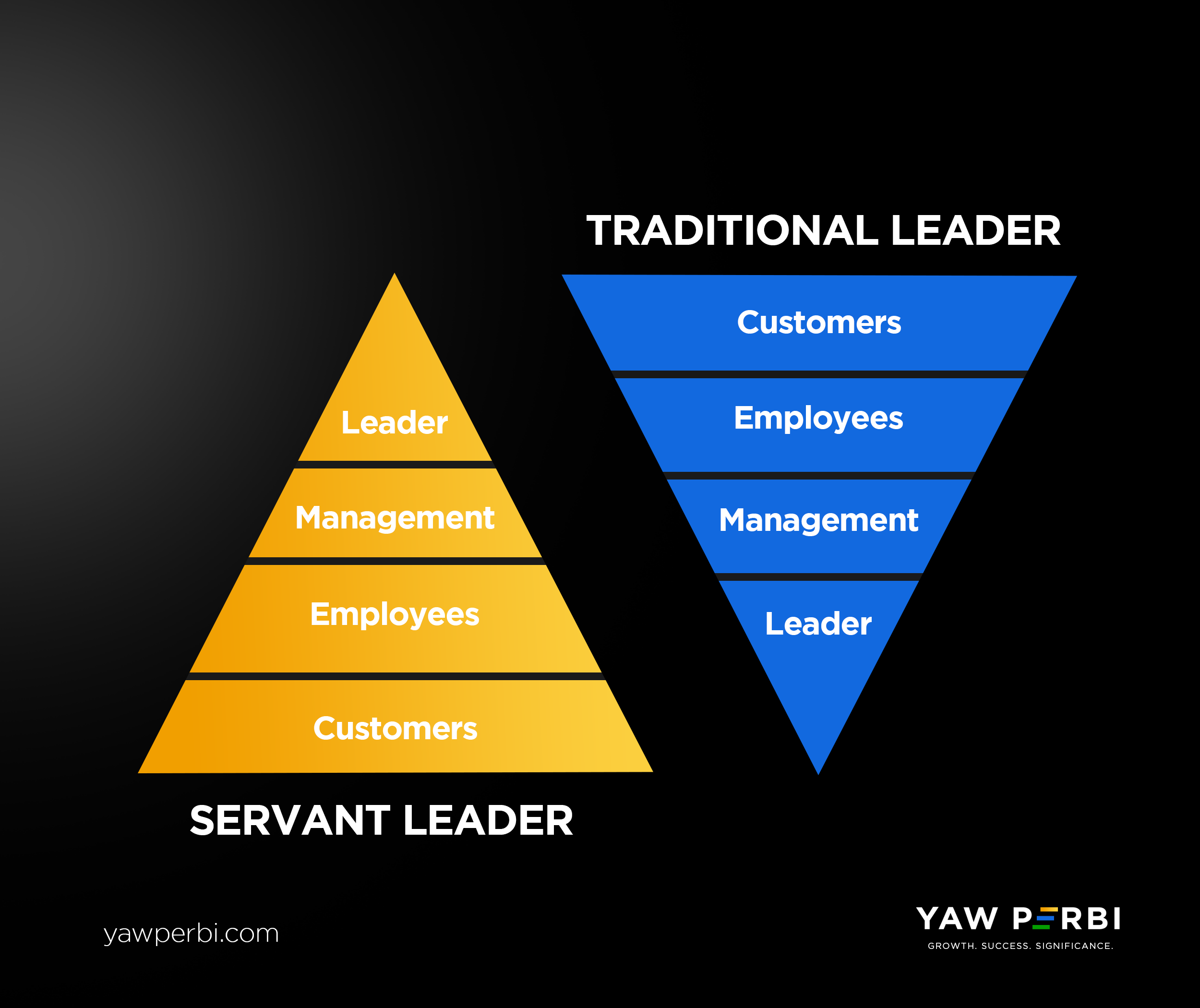
The World Needs More Servant Leaders, Irrespective of Whose Idea It Is
On Monday, we explored leadership theories over the last 200 years at Perbi Cubs Academy (nickname for our Staff Leadership Development program in collaboration with YAW PERBI Executive Education). That Servant Leadership is considered a 1990’s theory never ceases to tickle me.
Growing up in a Christian home I learnt Servant Leadership at a tender age from the life and lips of Jesus of Nazareth. Class act: It was just before the Passover Festival. Jesus knew that the hour had come for him to leave this world and go to the Heavenly Father, God. Having loved his own who were in the world, he loved them to the end. Jesus knew that the Father had put all things under his power, and that he had come from God and was returning to God; so he got up from the meal, took off his outer clothing, and wrapped a towel around his waist. After that, he poured water into a basin and began to wash his disciples’ feet, drying them with the towel that was wrapped around him. (paraphrase of portions of John 13)
When he had finished washing their feet, he put on his clothes and returned to his place and these were his classic words: “Do you understand what I have done for you? You call me ‘Teacher’ and ‘Master,’ and rightly so, for that is what I am. Now that I, your Master and Teacher, have washed your feet, you also should wash one another’s feet. I have set you an example that you should do as I have done for you. Very truly I tell you, no servant is greater than his master, nor is a messenger greater than the one who sent him. Now that you know these things, you will be blessed if you do them.”
Earlier, in response to jostling over position and power among his inner circle, he had contrasted ‘Traditional Leadership’ with ‘Servant Leadership’ and called them to a higher standard: the latter. He told them, “In this world the kings and great men lord it over their people, yet they are called ‘benefactors’ or ‘friends of the people.’ But among you it will be different. Not so with you! Those who are the greatest among you should take the lowest rank, and the leader should be like a servant.”
Through history, many many men and women—including Mahatma Gandhi, Martin Luther King Jnr., Florence Nightingale, Mother Teresa and Nelson Mandela— have exemplified Servant Leadership. This isn’t just altruistic spiritual and sociopolitical talk. Today, professors like Jim Collins (of ‘Good to Great’ fame) speak of the power of such ‘Level 5’ Servant Leaders in business and companies like Southwestern Airlines have benefited from even the commercial value of Servant Leadership.
Two millennia after Jesus, Robert Greenleaf makes Servant Leadership wildly popular and gets credit in the leadership literature for it. Fascinating. Even more intriguing is Greenleaf’s claim that “the idea of the servant as leader” came to him from German Hermann Hesse’s 1932 novel, ‘Journey to the East.’ I wonder where Jesus got his idea and practice of Servant Leadership from.
That was Monday. The musings continued unabated. Then what do I discover is this Thursday morning’s exhortation from the Bible app? “Do nothing out of selfish ambition or vain conceit, but in humility consider others better than yourselves. Each of you should look not only to your own interests, but also to the interests of others.” Those are the words of the lawyer-turned-preacher, Paul, to his audience in the city of Philippi.
The message, to me at least, is clear: just do it! Lead like a servant; serve as a leader.

3 Ways People Buy Into Leadership
A young aspiring writer once asked me a question I had never thought of. As a published author–at the time I had just one book to my credit, I think–he asked me, “When you published your first book did you have no concern at all that it might not sell?” Frankly, that possibility had not even crossed my mind, but now that he asked I began to soul search: “Really, what if it never sold?” The lad’s concern is a question of buy-in. In other words, how sure was I that people would buy into me or my message to part with their hard-earned cash for copies. The fact is, within six months I had recouped all my initial borrowed money, paid off my investor and had recurrent capital to keep going. And I haven’t stopped, a dozen-and-a-half books later. Have I just been ‘lucky’?
Another question related to buy-in I recently pondered was during the nineteenth anniversary of the global holistic leadership development organization I founded as a medical student in 2003. I still remember that May Day, workers’ holiday in Ghana (our version of Labour Day), when I gathered eight of my friends and cast a vision of an organization that would inspire and empower young people to discover their God-given purpose and reach their full potential—and that one day we would be international. Somehow they bought into it–was it me, the message, the vision? For weeks we brainstormed until we came up with the name ‘The HuD Group’, then for several more months that followed we set up administrative structures and started running programmes and projects. Today, we have representation and active work in over two dozen countries on all continents with impact in over sixty nations.
ALL ABOUT BUY-IN
These two stories beg the question, what does it take for people to buy into leadership? Almost always, the news from the two countries I’ve lived in for over a decade each and love are replete with stories of government leadership attempting to implement one policy or the other and experiencing resistance or lack of buy-in. In Canada it often is wrangling over oil and gas pipelines. Two of the hottest buy-in issues in Ghana right now have been the passage of a levy on electronic money transfers (especially mobile money) and a not-so-transparent process surrounding the construction of a national cathedral.
With the news as a backdrop, the following precious leadership thoughts have evolved from a confluence of three supposedly independent situations I personally experienced within days of each other. First, during a very enlightening webinar, the trainer, a fellow catalyst with the Lausanne Movement, had mentioned that most people who might not trust a person enough to follow them can at least trust a well-laid out process. Then a couple of days later I was thinking through the incredible leadership feat of the diasporic Jewish cup-bearer-turned-city-builder Nehemiah. In preparation for Lausanne leaders meetings in New York City, I had begun to re-read that Hebrew Bible classic case study in leadership and was intrigued by how one man’s burden became a whole nation’s blessing. Thirdly, this was the same weekend I was to ‘walk the stage’ to accept my Covid-delayed Master of Arts in Global Leadership degree from Fuller Theological Seminary. That’s my mentor Dr. John C. Maxwell’s alma mater as well, and I was pondering what John calls “the Law of Buy-in.”
THE 3 P’S IN THE LEADERSHIP EQUATION
From my academic learnings and practical experience, I have come to appreciate that there are three (3) main routes to leadership buy-in. When I speak of three ways people buy into leadership, I suppose most people would read that as three ways people buy into a leader/leaders but no. Leadership is a relational process with three key cardinal points: the Person of a leader, the People being led and the Purpose being pursued.
More often than not, the leader–who is a responsible Person that serves and influences People to achieve a shared, noble Purpose–is the one who feels the burden of a need, like in the case of Nehemiah in the fifth century B.C. Everyone knew that the Jewish remnant that had survived the exile was in “great trouble and disgrace” and that “the wall of Jerusalem was broken down and its gates charred to coal.” Somehow this burdened Nehemiah profoundly. It is such deep burdens that lead to burning desires which result in vivid visions (purpose), like an ambitious 52-day-city-wall-rebuilding capital project for those in Nehemiah’s day.
Then from the Purpose is a Plan/Process to which people are mobilized who then (hopefully) catch the same burden, develop a similar desire and apprehend the same vision. This is what I call the Leadership Buy-in Scheme:
- People buy into the Purpose (Vision)
- People buy into the Person (Leader)
- People buy into the Process (Plan)
- Buying into the Purpose
In my opinion, the most sustainable mobilization of People to join a cause is when they can get it right from the burden phase, to the desire stage and then catch the vision or Purpose. Some cut to the chase and just buy into the desire or even more direct, straight into the vision/Purpose. These routes work too but from over three decades of being in the leader development space I find nothing beats starting from two blocks back. The primary way people get mobilized to a cause is to buy into the burden (A1), then the desire (A2) and then the vision (A3).
- Buying into the Person
The entire leadership buy-in scheme revolves round the Person of the leader. Often, (s)he is the one People are mobilized to buy into, almost not caring about the Purpose or Process. While I surmise this pertains mostly to collectivist cultures, even some from individualistic cultures swear by this as the number one way people are mobilized to a cause. In fact, for John C. Maxwell, this is the Law of Buy-in. As the fourteenth law in The 21 Irrefutable Laws of Leadership, Dr. Maxwell states that “people first buy into the leader, and then into their vision.” So in other words, if you want others to follow your vision (Purpose), you need them to, first and foremost, follow you—their leader.
While there may be a lead Person people buy into, they might very well also buy into other People the leader has surrounded himself with or already galvanized.
- Buying into the Process
So back to the beginning, the initial webinar statement that precipitated all these copious leadership thoughts. We were discussing a context where someone was attempting to lead a network of other organizations to tackle a big dream that neither one of their entities, no matter how big, could handle alone. Remember that the presenter had stated–he didn’t come across as postulating, he was stating a principal principle–that people trust a Process/Plan even before they trust a Person.
Having lived on both sides of the Atlantic for at least more than a decade each, I see the Two-Thirds world (Africans, Latin Americans and Asians) more likely to buy into the Person first and and the Western world generally inclined towards trusting the Process first.
Conclusion
So the three ways people buy into leadership are via the Purpose, Person and/or Process. We could also say buying into the Message, Messenger and the Medium (why else do you think advertisers pay huge sums of money to have influences be their messengers?). At the end of the day, a leader requires a team to make the dream. No great vision can be accomplished by just one (wo)man, no matter how great they are. The best mobilized people for a cause is when they buy into the Purpose, the Person and the Process–all three. Even for the Purpose, it’s best when they first feel the burden and grow it into a desire before it becomes a vision to pursue rather than just plugging straight into the vision. People buying into two of the three P’s is not so bad either but how could a two-legged stool ever rival one that has three solid legs? Aim for the triple buy-in: the Purpose, the Person and the Process.

YAW PERBI Welcomes New Chief of Staff
“I am honoured to join YAWPERBI as Chief of Staff,” says Mrs. Araba Andoh (nee Torson). “I have had 3-4 years collective experience working behind the scenes in organizing, prioritizing, advising and positioning leaders as “superhumans,” she adds.
Araba holds a BSc in Business Administration from Ashesi University (Ghana) and an MSc in International Business from the University of Warwick (UK).
With a good dose of humour, she likes to describe her personality as “vanilla ice cream with a dash of cinnamon spice on a crunchy cone. Like vanilla, I may come across as simple at first glance. Just as vanilla serves as a vivid reminder of youth and innovation, I am youthful and bursting with creativity.”
Wait. She isn’t done yet: “The subtle taste of cinnamon reveals how accurately the spice was added in proportion, depicting my hunger for detailed perfection. The softness of the ice cream on a crunchy cone exterior portrays me perfectly as a tough nut who is difficult to crack and works extremely well under pressure. Again, like an ice cream, it takes me a while to warm up to people, but once I do, I melt into their hearts.”
Help us welcome and celebrate ARABA (Awesome. Reliable. Affable. Bold. Affectionate.)
Here’s to more #leadership #growth, #success and #significance at #YP.
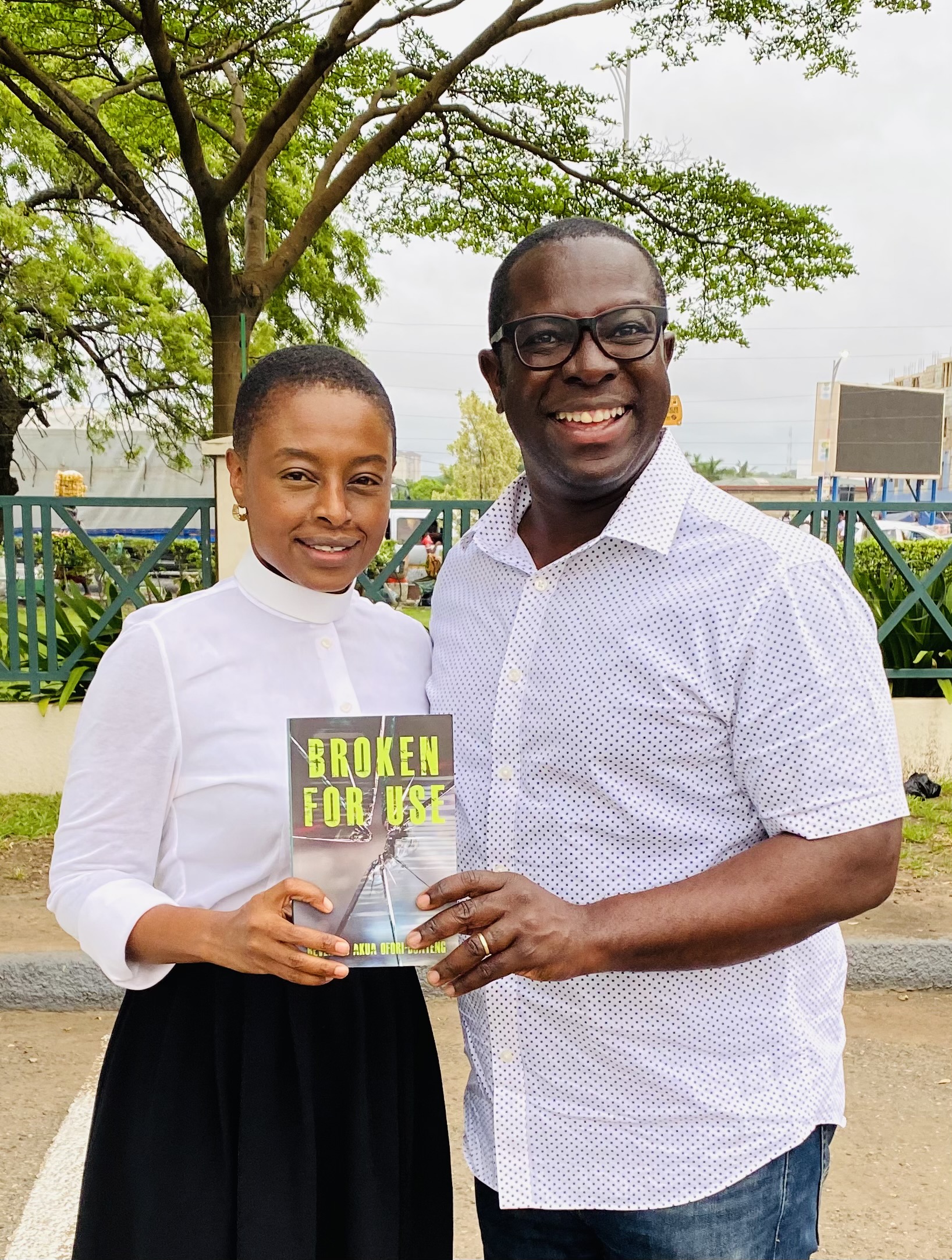
Leading From Life Story
Leadership is an interesting phenomenon. It is a more personal phenomenon than many people realize. I have been studying leadership for a while, at least for the last twenty-five plus years, and one of the greatest discoveries for me has been that leadership is not something ‘up there’ or ‘out there.’ The greatest leaders have been those who have been able to deeply reflect on their life stories and reframe them, leveraging their life stories to lead.
Growing up in Ghana as a student of leadership, a lot of the apt illustrations and gripping stories I consumed were foreign, mainly coming from Western literature and audiovisuals. A case in point is Howard Schultz, CEO of Starbucks, as one of the best examples of how the corporate success of Starbucks is as a result of the reframing of his own life story, especially his dad’s misfortunes. Says Mr. Schultz himself, “The reservoir of all my life experiences shaped me as a person and a leader.” Now, I am really excited that many more Africans are telling their leadership stories and writing, putting them in print. Finally, the lions are learning to write their own tales of the hunt.
MEET THE MECHANICAL ENGINEERING MBA
One of the CEOs in Ghana whose life story has taken a firm grip on me is a young lady I’ve just come to love. First, she’s just an amazing human being, very authentic. Then Akua is a professional in her own right, with a Masters in Mechanical Engineering, an MBA, a third seminarian masters and actually studying for a Ph.D as well. But the icing on the cake for me is this: she is a priest too!
The fascinating story of Rev. Akua Ofori-Boateng is chronicled in her thrilling autobiography aptly entitled ‘Broken For Use.’ It is raw, real, and very vulnerable—perhaps the most vulnerable Ghanaian, or maybe even African, autobiography that I have read.
Akua is CEO of Aequitas, an organization desirous to see every youth find and pursue their passion. She and her team do this by providing internships and safe learning spaces for youth to explore, discover their gifts and find their purpose. And when you have read her story—the intriguing tale of a privileged, middle-class girl yearning for approval—you will immediately understand why she would found and lead such an organization—from her life story!
WHY LEADING FROM LIFE STORY MATTERS
The passion and purpose of your leadership would come from your life story. If you are going to have dedication and commitment to leadership, it will need to come from leading from your life story. If you are going to have inspiration and motivation, it comes from your life story. If you are going to have a true north for your leadership, it comes from your life story.
I am exceedingly glad to be collaborating with her at YAW PERBI to impact youth and C-Level Executives because authentic leadership comes from leading from your story. Watch out for opportunities for collaborative training, coaching, workshops, publishing etc. with the Rev. when it comes to this whole area of authentic leadership. Just before wrapping up lunch with her the other day, I wanted her to share with you why she wrote this book and what it means for her life and leadership. You may watch the short, unrehearsed and upstaged video I captured here or read a transcript of her convincing spiel below:
Rev. Akua Ofori-Boateng: I wrote this book because when I was young and struggling with my own insecurities and challenges, I didn’t have any book like this to read, anything to tell me of that what I was going through was normal and that anybody had been through such. Certainly no one my age was talking about it from being that age. I wrote this so that young people who are struggling and unable to forgive themselves and have made some of the mistakes I made would recognize that we all make mistakes and that there is life after mistakes. The life after mistakes is a good life and a fulfilling one and a life that can benefit other people.
Dr. Yaw Perbi: How has your life story shaped your leadership?
Rev. Akua Ofori-Boateng: My life story and my leadership are inseparable. For me, I lead from a place of what I have experienced. And I want the young people to understand that you are not talking to perfection. You are talking to a person who is giving you advice based on their own issues, mistakes they have made and overcome so I lead from a place of authenticity. I got it wrong and now I’ve got it right; and if you got it wrong, you can get it right too.
CONCLUSION
Notable leadership experts from Bobby Clinton to Bill George have divided life into phases, usually three or four. It takes deep reflection to draw these out for oneself. The power of leading from life story is one of the many reasons why self-awareness is a sine qua non in leadership. There is no authentic or deep leadership without knowing one’s life story and reframing it as a source of inspiration, dedication and commitment, passion and purpose for your leadership. Your best leadership will not come from trying out a long list of characteristics of great leaders or even emulating outstanding ones, but from deeply reflecting on and leveraging your own life story. It will come from ‘in here’. The raw material needed for great leadership is found in your own life story. What a fascinating paradox that the outward journey of serving and influencing others first begins with a leader’s own journey inwards and backwards, drawing from the power of their own life story.

Leadership Is Not About You (And Not About Now)
Here I am 40,000 feet above sea level trying to piece together in readable form, a short video I shared last week on “Leadership is Not About You.” I’m en route back from an East Africa launch of my new co-authored book that took me to Nairobi (Kenya), Dar es Salaam (Tanzania) and Kigali (Rwanda), with a brief transit in Addis Ababa (Ethiopia). It’s been a while since I shot these PEP Talk videos because all roads have been leading to the launch of the movement and the said book, Africa to the Rest. The West Africa launch in Accra on March 31st had been so successful, buoying my team and me towards where the African sun rises for part two.
COMING HOME
Leadership is not about you, it’s about those you serve; it’s not about now, it’s about tomorrow. This truism landed in my heart as I touched down in Nairobi to a very warm welcome, ‘Karibu Kenya’ (welcome to Kenya). In Ghana we say, ‘Akwaaba.’ Ghana and Kenya have a diplomatic arrangement which allows citizens to visit each other’s countries without a visa. How wonderful. And this time also, the immigration officer did not ask me, “Why are you here, what’s the purpose of your visit?” Come to think of it, why would he? Who asks anybody, “Why are you coming home?” I’m home, Kenya is home.
That really is how the whole continent should look like yet traveling across Africa can be a nightmare. I am looking forward to the day when we do not need visas to travel across the second largest continent on the planet. I earnestly envisage the time when we’ll not have to change several currencies to travel across Africa. I am looking forward to the time when with one passport, one can fluidly go to all the 50 plus countries on the motherland. And that, my friend, will take tremendous leadership. How come I did not need a visa to Kenya, that all the way from Ghana, six hours flight away, I could just enter Kenya unhindered by red tape? Because at some point, once upon the time, a certain leader (or group of leaders) thought that was something great we could do for the mutual benefit of our peoples, for every Ghanaian and Kenyan.
As the driver was taking me from the Jomo Kenyatta International Airport (JKIA) to Severine Cottages in Karen (a suburb of Nairobi) where I was scheduled to lodge, courtesy of the owner Mary Ngechu, a YAW PERBI coaching client, we were having a conversation amidst a bit of road congestion from time to time. There had been some redirection of traffic in Nairobi because Kenya had just lost their third president, Mwai Kibaki, and this was preparation day for the funeral in the morrow. The next day was a holiday for his state burial, and several continental dignitaries were expected to arrive via the JKI airport. This driver was full of praise for the late head of state. “He was a good man, he built this highway we’re on, started free primary education for every Kenyan child…” he did this, he did that…. he was a good man. Far from perfect, it seemed from the narrative that Kibaki understood that his leadership was not about him, but about those he can been given influence to serve; and that his leadership wasn’t just about then (2002-2013), but about tomorrow.
NOT ABOUT YOU
Leadership is not about us; it’s not about you. It’s all about those we serve and influence towards some shared, noble purpose. I find it very sad when we have leaders, especially on our continent, who wants to loot all the wealth they can get, grab all they can eat and can the rest for tomorrow for their children and grandchildren. But leadership is about the people, for the people.
The year 2063 is when the leadership of Africa is hoping to have one passport and this free, unhindered movement of people. It’s too far! By 2063, I will be 85 years old, if the Lord wills and if He tarries. Come on, things have to be sooner, much sooner. I am excited about the crucial interventions of YAW PERBI Executive Education, BCA Leadership, Africa Leadership Initiative, The HuD Group and all others working on the continent to catalyze authentic, effectual leadership because everything does rise and fall on leadership. Leadership is indeed cause, everything else is effect, and l felt that right that morning when arrived in Kenya.
AFRICA CONSOLIDATING
I can confidently tell you that the dream of one Africa, one passport, no visas can happen. It took a certain Jean Monnet to get the European Union going in that direction (I remember that so vivildly from our Africa Leadership Initiative/Aspen Institute readings from over a decade ago). The ability to not only fly from the top of Tunisia to the tip of South Africa, or from the cusp of the Cape Verde peninsula to the extreme edge of Mauritius unfettered and unvisa-ed, but even drive across the length and breadth of the continent is a dream I share with many others on the continent and in the diaspora. Imagine no need to change several SIM cards, no need for consecutive currency exchanges and having eight different specimens of shillings in your breaking purse. This is the Africa we want; yea, even the Africa we need.
For sure, this will take visionary, effectual leadership. Remember, leadership is not about us, it is about those we lead and their aspirations, even that of those who would come tomorrow. Are you pepped up to lead and leave a lasting legacy? Leadership is not about you, it’s about those you serve and influence towards a shared, noble purpose. It’s not even about now; it’s about tomorrow. Let your leadership count years from now, thousands of years from now, even into eternity.
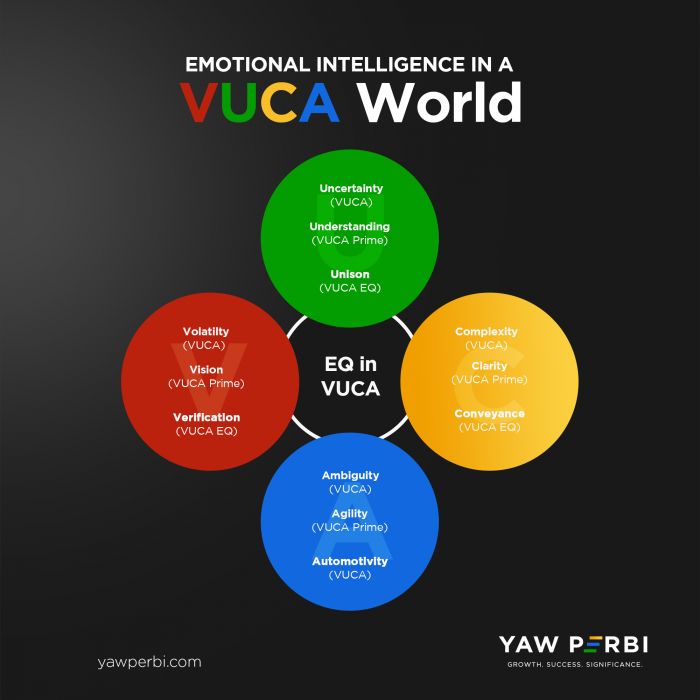
SO YOU THINK YOU CAN LEAD WITHOUT EQ IN A VUCA WORLD?
As one of the Pan African Cohort facilitators of BCA Leadership, I just got off a scintillating Zoom call with amazing African C-level leaders from across the continent—East Africa (like Kenya and Uganda), West Africa (I recall Nigeria, Sierra Leone and Ghana), North Africa (Egypt) and Southern Africa (Malawi, South Africa). We talked about Emotional Intelligence and the whole idea of VUCA. The goal of this blog is to summarize the essentials of the topic, which most participants described as ‘intriguing’: “So you think you can lead effectively without EQ in a VUCA world?” Really, this is a rhetorical question because no one in their right senses would say, “Yes, I can lead effectively without Emotional Intelligence (EQ)” in the first place, let alone in a world that’s described as VUCA.
WHAT ON EARTH IS VUCA?
VUCA is a term that came from the military space, especially at the end of the cold world war when without the two clear polarizing forces the whole world was described as Volatile, Uncertain, Complex, and Ambiguous. Guess what? If the end of the last century was said to be VUCA then imagine just how much more VUCA it is now. Look at the volatility of the world today, look at the speed of transformation, the dizzying digital economy. Consider the uncertainty with COVID-19 and this post-pandemic world. Is it even a post-pandemic or rather para-pandemic world as in some places it seems over and in others, COVID is still raging? Look at the complexity of the world. How could a microscopic virus emerge in a small place in some corner of the world called Wuhan, China, and the whole world gets grabbed into this? Some things are just ambiguous right now. It’s a VUCA world. There wouldn’t be enough space to write out all the feelings these VUCA times have generated in people, especially anxiety.
HOW ABOUT EQ?
Even before the VUCAness of the world, Emotional Intelligence had been identified as the key thing for succeeding in leadership. It is archaic 20th century thinking that IQ (intelligence quotient) makes a good leader for a total leader not only has IQ, in terms of book smarts or cognitive intelligence, but also Emotional Intelligence (EI/EQ) in terms of being intelligent about feelings and Global Intelligence (GQ). Humans like to think we are rational people but at the end of the day we are emotional beings. The term was first coined in 1990 by researchers John Mayer and Peter Salovey, but was later popularized by psychologist Daniel Goleman five years later.
We now know that 80-90% of success in Executive Leadership depends on Emotional Intelligence and not cognitive intelligence. Don’t get me wrong, I am not dumb. I am a medical doctor for crying out loud. Intelligence is important but guess what? When it comes to Executive Leadership, IQ only gets you into the door, it takes EQ to play the game. And win. After about 128, IQ doesn’t matter anymore! Given the same level of IQ, technical skills, and competence, it’s EQ that would make all the difference in how much one succeeds (or not).
Emotional intelligence, according to Psychology Today, is “the ability to identify and manage one’s own emotions, as well as the emotions of others.” It is thus made up of the following four blocks:
BUT THERE’S PROBLEM
So being the amazing leaders we are, we figured out we cannot just sit idly twiddling our thumbs and watch VUCA happen without responding. In 2007, one Robert Johansen (a distinguished fellow at the Institute for the Future), came up with a behavioral leadership model he called VUCA Prime to counteract each of the four elements of VUCA with a specific positive response which starts with the same four letters. VUCA Prime then is to have Vision over Volatility, to overcome Uncertainty let’s have Understanding, then Clarity over Complexity and to overcome Ambiguity let there be Agility.
Well, I have been studying this since the pandemic began and was thinking recently how good VUCA Prime is but how so very cognitive it is! Why is VUCA Prime so cognitive and does not take enough emotions into cognizance especially when we know 90% of success will depend on a leader’s emotional awareness (of self and others) and responses?
WHAT IS VUCA EQ THEN?
Consequently, I have designed something called VUCA EQ to provide a more comprehensive and potent leadership response to VUCA beyond the cognitive, one that significantly takes emotional intelligence into consideration. Like VUCA Prime, each of the VUCA EQ responses also begins with the same four letters.
Firstly, V is Verification: we need to be able to decipher what our emotions are and label them correctly. Then we need to be able to do the same for others as well so we can respond rather than just react, and we can manage our emotions and that of others instead of just trying to control them. The world of command and control is gone!
Secondly, instead of Uncertainty and just responding with the cognitive Understanding that VUCA Prime proposes, we rather respond in Unison. What I mean by Unison is to respond with our three brains. You have the cognitive brain but you also have your emotional brain called the limbic system. EQ is not just a ‘heart’ kind of thing, no! Emotional Intelligence has to do with the brain too. Or even more annoying, called ‘soft skills.’ EQ produces hard results on the balance sheet and cashflow statements! There is the Cognitive brain, Emotional brain, and Instinctive brain and VUCA EQ is about responding with all three in unison.
For Complexity, not only overcome with clarity but with Conveyance. Powerfully transmit emotional then logical information and carry across values and perspectives, considering emotional data and communicating emotions first. Remember to start with emotional data when decision-making and communicating eg. I feel vexxed about this decision and I’m aware most people in the company feel anxious…. Connect with emotions and convey them in response to complexity.
Then finally, for Ambiguity, not only thrive with agility but by Automotivity. In other words, learn to move people’s emotions or move people emotionally. Automotivity means containing within itself the means of propulsion or movement. Mobilize people in such consonance and resonance with what they want (motives) and how they want (motivations) that they move in a self-propelling manner. After all, why do you suppose feelings are called e-motions? Feelings move us, they move the world. We may not like to acknowledge it but they do. How do you learn to know people’s motives and their motivations so that you can ride on that to send them (better still, travel with them) to a place where they ought to go?
CONCLUSION
Leadership is in the transportation business. We move people from here to there and without the power of Emotional Intelligence to move people (think e-motions) towards a shared, noble purpose, we are going nowhere ourselves in the first place and taking no one with us for that matter. Don’t you ever think you can successfully lead, especially in this VUCA world, without Emotional Intelligence.

‘I DO’ or ‘NO CLUE’?
Happy Saint Valentine’s Day! I think it makes a difference when you prefix the ‘saint’ before ‘Valentine’s Day’ because unfortunately a lot of unholy things happen on Valentine’s day but it’s a day to celebrate a saint who out of love, gave of himself for others. That’s what the essence of love is, it’s not so much what we can get but what we can give.
This is why I love the commonest scripture which numerous people who are not even Christ-followers know that by heart (John 3:16): “ For God so loved the world that He gave…” Love is three things (3As): Love is an affect (emotion), an attitude, and an action. If you would take another look at the most famous passage in all the world about love, 1 Corinthians 13, you would see love showing up mainly as attitude and action. There are a few affects sprinkled here and there but mainly attitude and action. That’s what love is–not just an affect and an attitude but love is action, so love gives.
On this particular Valentine’s day, I want to send a shout out to the love of my life, Naa Anyele Perbi (nee Ampa-Sowa). We’ve been married for over 15 years now and one of the things that has saved and sweetened our marriage is searching for and satisfying each other’s emotional needs, something we learned from marriage mentors of ours in Montreal, Canada. Gerry and Kathy Kraemer do a marriage workshop and illustrate this beautifully. The point is that each of us–depending on where and how we were born and raised, our make-up/wiring, personality, life’s critical incidents etc.–receive love differently. This is not just the general and popular ‘five love languages’, no! This is way beyond that. This is deeper than that. Based on our life stories, we each have unique emotional needs.
The Kraemers love to tell the emotional needs tale this way: On the day we get married you we exchange vows and say, “I do.” Gerry and Kathy half-joking assert that we probably should rather say, “No clue!” instead of “I do!” for indeed, we have no clue what we are getting into, no matter how much in love we are and how much we think we know of ourselves and of the other. They actually project their 1970s wedding picture and ‘photoshop’ in an ‘invisible’ suitcase by each of them, symbolizing the baggage each of us comes into a marriage relationship with!
And this is how they illustrate it: Gerry is blindfolded by his wife, who then holds a cut-out heart, a big heart, right in front of her. Now, Gerry holding a bow and arrow (the plastic kind with a sucker at the end) then tries to hit the target, the heart of his dear Kathy, going boom, boom boom!!!! And guess what? He misses Kathy’s heart every time. Until eventually he allows her to remove the blindfold so he can now see exactly where her heart is and can strike it point blank or from afar, any and every time.
The point is this: there are a lot of books and audiovisuals out there that talk about love and romance in such generic terms such as ladies love flowers and guys like sex. Don’t buy this stuff! There are guys who love flowers and gals who have a bigger desire and capacity for sex than most men you know! There is actual work to do in specifically finding out through conversation and some tools (those who take our YAW PERBI Family Foundations Mastermind actually get to go through this) to know these things. Basically, you can find out from conservations with or without expert help. What makes your spouse feel fully alive? In other words, what gives oxygen to their souls? When you find that out (when your spouse let’s you in on the master key(s)–and by the way you don’t have to understand it!, you don’t even have to like it–just do it! When your spouse says, “I am XYZ and this is how l love to be loved, would you love me this way?” I hope your answer would be yes!
Today being St. Valentine’s Day, a lot of people are going to give gifts that they would have loved to receive; not gifts people would loved to get, necessarily. That’s how humans behave: we tend to give what we would like ourselves or what we think is good. But if we would take the time to hear the heart of whoever we’re trying to love, they would tell us, they would give us a clue what makes them feel loved or what gives oxygen to their souls.
“I am Yaw, this is how I love to be loved… (Errrm… I won’t tell you! Only Anyele knows that!) …Would you love me this way?” Love somebody the way they want to be loved, the way they feel loved this Valentine’s Day; not the way we want to love them. Have a Happy Valentine‘s Day!!! and a great month celebrating love, true and love, lasting love, pure love, for God is love. Whatever you do today, may be it be saintly!
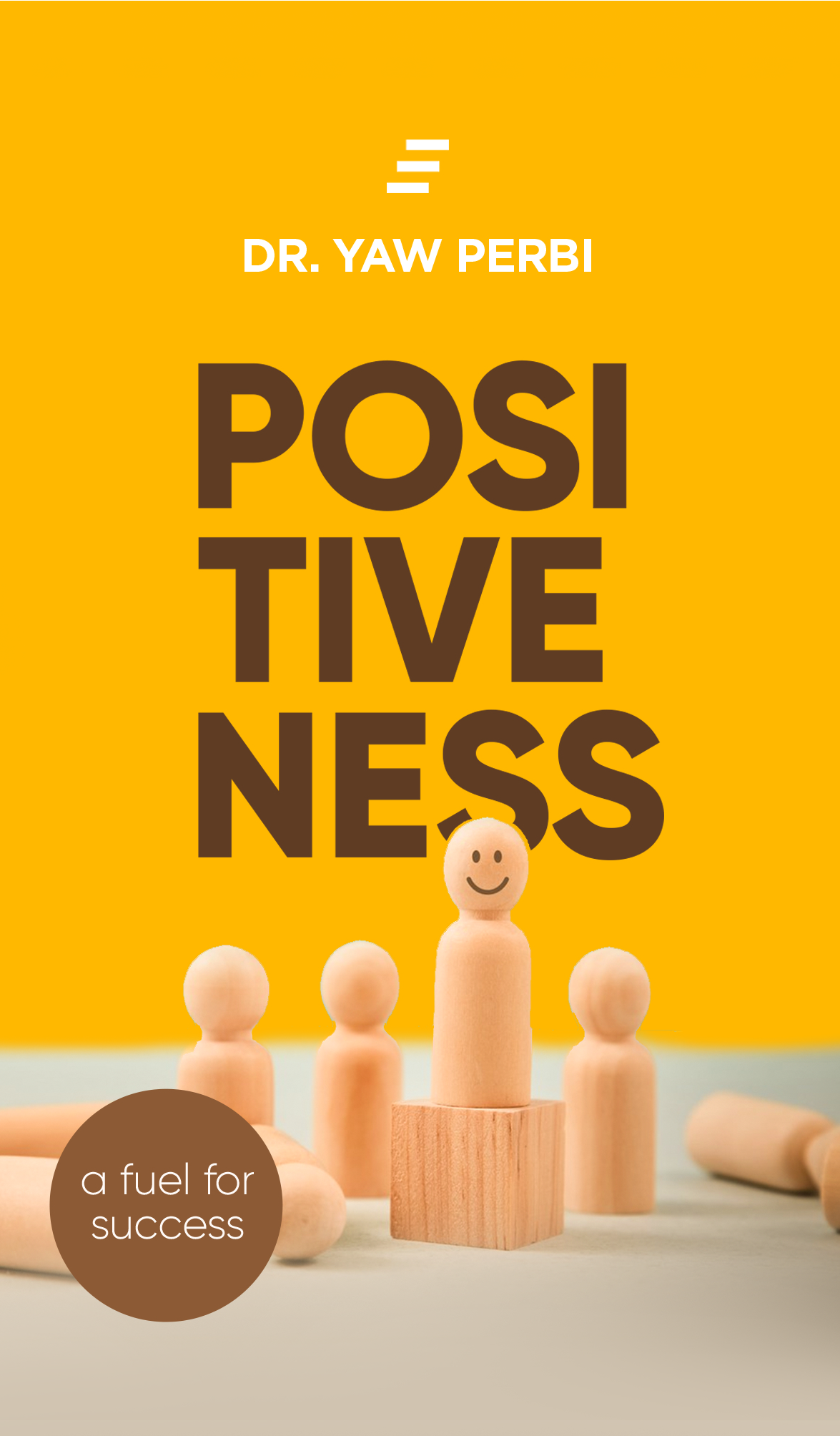
PANDEMIC OR NO PANDEMIC, POSITIVENESS IS STILL A FUEL FOR SUCCESS
The following is a snap peak of the preface to the third edition of Dr. Yaw Perbi’s third book, ‘Positiveness: a fuel for success’, first published in 2003 to commemorate his silver jubilee.
It took a global pandemic to make this third edition of Positiveness: A Fuel for Success, possible. I have been trying to republish this book for nearly a decade now. The revised manuscript was done in 2012, and I had nearly completed the back-and-forth with a publishing company. All was ready to go, or so I thought. Then life happened and I put this on the backburner. Until now. It took the lockdowns of the Coronavirus pandemic of 2020 to get this going again.
I have changed a lot since I turned 25 and first launched this book and so have many things too. We didn’t even have smartphones back then, and the internet was still a novelty. But some things have remained the same. After thousands of copies sold and many countries reached, “through all the changing scenes of life, in trouble and joy,” what hasn’t changed is the fact that positiveness is still fuel for success.
In the past two decades, I have lived and worked for a year or more in three countries on two continents. In doing so, I have needed a whole lot of positiveness, especially in those times when I was geographically separated from my family. I have formally had various occupations and preoccupations ranging from being a medical doctor in Ghana, a military captain with the United Nations in Cote d’Ivoire, a leadership consultant and speaker around the world, pastor of a Chinese congregation in the French city of Montreal, a financial security advisor and investment consultant, to being president of a couple of Canadian and global charities. Positiveness is still fuel for success no matter the field of endeavour.
You see, this book was only my third book and, back in 2003, I wrote and self-published it with a white cover and silver inscriptions to celebrate my twenty-fifth birthday (silver jubilee). At the time, I was a struggling medical student in Ghana attempting to do ‘what Napoleon couldn’t do’. I was trying to straddle the world of medicine and human development. In May 2003, together with a group of friends, while still in med school, I founded The HuD Group to inspire and empower young people to reach their full potential. Now I am a full-fledged medical doctor who has hung up his stethoscope— after four years of clinical practice—to focus on human development, especially holistic leadership development, because I sincerely believe, like my mentor John C. Maxwell, that “everything rises and falls on leadership.”
The HuD Group began in Ghana but, at the time of writing this, I am feverishly coordinating our global operations in two dozen countries on all continents of the world and currently domiciled in Montreal, Canada. If I thought I needed a daily prescription of positiveness back in 2003, then I might need a thrice daily prescription now. The two-year battle with the Canada Revenue Agency alone to get charitable status for The HuD Group warrants a book on its own. I’ll save that for another day, but it took positiveness to fuel my success.
When I was much younger and naïve, I dreamed of working with the United Nations. And unlike many for whom that is still a dream, I achieved it. I did that, for a year, in La Cote d’Ivoire. Even while already enjoying that success, I still needed positiveness as fuel when I got car-wrecked on July 21, 2008 and lost two of the military colleagues I was travelling with. It was positiveness that got me back on the road to recovery. My commanding officer, out of rare soldier-sympathy, wanted me to return home (to Accra, Ghana) and recuperate but cheers to positiveness, I was convinced to stay put and serve with grace. I prevailed. Positiveness prevailed.
So yes, life has changed—a whole lot— and so have I since 2003. Now married to my dear wife, Anyele, and a father to seven amazing children, I certainly have a broader and deeper perspective on life today. But if anything, these changes have only affirmed and confirmed the principles that were penned in this book nearly two decades ago. Positiveness is fuel for growth, success, and significance in any and every endeavour, and at whatever age and stage in life, that hasn’t changed.

